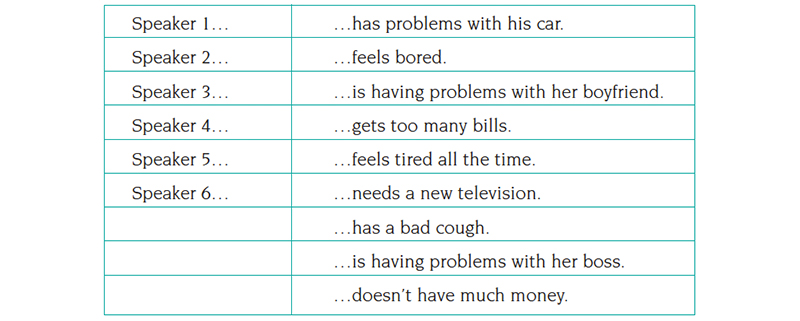Aprenda aqui a pedir e dar conselhos em inglês!
1 . Ouça a gravação em que seis pessoas diferentes descrevem um problema. Indique o problema de cada uma delas de acordo com a lista abaixo. Preste atenção, pois três problemas não são mencionados.

2 . Você ouvirá alguém dar conselhos para cada uma das pessoas do exercício 1. Diga para quem os conselhos são destinados.
3 . Aqui estão alguns dos conselhos que você ouviu no exercício 2. Preencha as lacunas com uma das palavras do quadro abaixo.
must | don’t | were | ought | should
1 If I ……………………… you, I’d take it to the garage.
2 Well, why ……………………… you go to the cinema?
3 You ……………………… talk to your boss.
4 You really ……………………… go to the doctor.
5 You ……………………… to explain how you feel.
Grammar: should / ought to / must / supposed to
Para dar conselhos ou falar sobre obrigações no presente, usamos should / ought to / must + infinitivo do verbo.
You should get a new job.
You must talk to your boss.
Quando queremos criticar alguém por ter ou não tomado determinada atitude, usamos should / ought to + present perfect .
You should have visited the doctor.
You ought to have gone on a diet.
Quando queremos falar de alguma coisa que esperávamos que alguém fizesse, mas que não aconteceu, usamos was / were supposed to + infinitivo do verbo.
You were supposed to arrive on time.
4 . Observe as frases abaixo à esquerda (1–7) e indique qual a melhor opção para continuar a afirmação à direita (a–g).
1 You were supposed to meet me outside the cinema last night.
2 You should have bought the tickets three weeks ago.
3 You ought to have practised more.
4 You ought to take some time off work.
5 You should go for a walk.
6 You must look for a new job.
7 You were supposed to phone me last night.
a) The fresh air will do you good.
b) I waited in all evening for your call.
c) If you had, you would have passed your driving test.
d) There won’t be any left now.
e) You’re clearly not happy in the job you’re doing now.
f) You’ll feel much better after a few days’ break.
g) I waited in the rain for over an hour.
20 minutes+
Leia as frases do exercício 4 novamente. Atribua a cada frase que descreve um conselho dado no momento a palavra present e atribua a palavra past para as que descrevem uma ação que poderia ter sido benéfica para alguém ou que esperávamos que alguém fizesse no passado.
1 You were supposed to meet me outside the cinema last night.
2 You should have bought the tickets three weeks ago.
3 You ought to have practised more.
4 You ought to take some time off work.
5 You should go for a walk.
6 You must look for a new job.
7 You were supposed to phone me last night.
Word Bank
cough (substantivo) = tosse
fire (verbo) = demitir
mistake (substantivo) = erro
pay rise (RU) / raise (EUA) (substantivo) = aumento de salário
As seguintes palavras e expressões podem ser usadas quando você deixa um emprego ou empresa:
leave
resign
hand in your notice (formal)
quit (levemente informal)
retire (deixar o cargo para se aposentar)
Respostas:
Exercício 1
Speaker 1 doesn’t have much money.
Speaker 2 feels tired all the time.
Speaker 3 has problems with his car.
Speaker 4 has a bad cough.
Speaker 5 is having problems with her boss.
Speaker 6 feels bored.
Exercício 2
1 Speaker 3
2 Speaker 6
3 Speaker 1
4 Speaker 2
5 Speaker 4
6 Speaker 5
Exercício 3
1 were
2 don’t
3 should (or must)
4 must (or should)
5 ought
Exercício 4
1 g
2 d
3 c
4 f
5 a
6 e
7 b
20 minutes+
1 past
2 past
3 past
4 present
5 present
6 present
7 past
 Sair da aula
Sair da aula